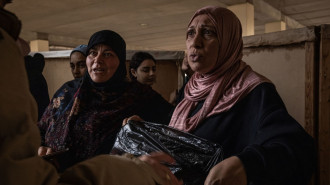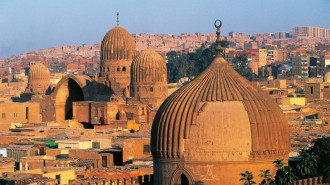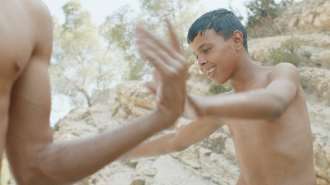The exile of Emel Mathlouthi, voice of Tunisia's youth generation
Back home, youth unemployment is at a record high. As economist Jihen Chandoul points out in a recent Guardian piece, IMF loans backed by G8-imposed austerity measures and ballooning national debt "are choking Tunisia", unfairly penalising the poor and middle class.
"The most vulnerable in our society are suffering; the middle classes are impoverished - and the brain drain has been accelerated by the dinar depreciation," Chandoul noted.
Emel Mathlouthi garnered international attention in January 2011 when, home from self-imposed Paris exile, she sang her surprise hit single Kelti Horra ["My Word is Free"] acapella during the protests against Tunisia's then-soon-to-be ousted president, Zine El Abidine Ben Ali.
The following year she dedicated her first album to social and political freedom. The album made such a powerful statement, she was later invited to sing Kelti Horra in Oslo, at the 2015 Nobel Peace Prize ceremonial concert.
Mathlouthi first exiled herself from Tunisia to expand her musical vocabulary and professional horizons, and the journey continues. She now lives in New York City.
"I don't feel displaced at all," she tells The New Arab. "I feel about New York the way I felt about Paris and Tunis, which is that we should all feel like citizens of the world because every one of us can feel at home in many different places and it's very important for us to connect with each other.
"I still belong to Tunisia, but the more I travel, the more I feel like I have multiple connections and journeys to many different parts of the world - and it brings a lot to me as a person and to my music."
She remembers her Nobel ceremony performance as one of the highlights of her life.
"Simply, it was magical, singing on a beautiful and very wide stage with a full orchestra would be any artist's dream, and there I was, singing something I wrote in a language that was foreign to many audiences but that yet spoke to the whole world, because it's the language of emotions, the language of the inside."
| Watch the official video for Emel's Ensen Dhaif |
Born in 1982, Mathlouthi is one of those daughters of the Millennium who will transform the modern Middle East and North Africa with her forward-thinking compositions, performances and personal commitment to change. Now 36, Mathlouthi found her identity and her voice as a free spirit using electronica and the Arabic language, inspired by a vision of solo women artists such as Joan Baez.
She interprets the zeitgeist - whether the powerless of Tunisia leading to the 2011 Jasmine Revolution or her millennial brothers and sisters of 2018, hungry for food and work - in nearly a dozen songs on her Ensen album, and occasional covers, like the flamenco ballad Naci En Palestina, which she sings in both the original Spanish and Arabic.
Mathlouthi imagined a musical life from the age of eight and by her late teens had joined a metal band at the university where she studied art and graphic design. Then came September 2001, and Arab identity underwent an international seismic shift, shaken by the events in New York and Afghanistan, and eventually Iraq. Emel evolved, learning to write her own lyrics, and found her voice transitioning through metal and rock to singing her own songs alone on stage.
 |
|
| Click here for our special coverage |
Though irrepressibly Tunisian, Mathlouthi insists she doesn't want to be known merely as a singer of the Tunisian revolution, nor does she consider her music exclusively belongs to the category of "world music". She finds western perceptions about Arabs and North Africans to be constricted and limiting.
"I think what's most important is to be a different voice out there, because within the music industry, people like us tend to struggle a little harder - especially singing in a language other than English, simply when you represent a universe that's rich and very singular and creative.
"It's a big challenge to make a difference, to be a kind of hope for other Arab artists. I want to encourage people to believe in themselves, to believe in their differences and their own voice."
For her first two albums, Mathlouthi wrote and sang her songs in Arabic, she will now answer the temptation to sound more universal.
"My next album is going to be mostly in English," she reveals.
"I have mostly written songs in Tunisian Arabic because it's the language that most conveyed my emotions, and states of mind that I've been going through, but I've already written ten songs in English. I like the process, though I didn't think it was going to be easy."
Mathlouthi began singing in English when she was 15, back when rock and metal were her musical scenes of choice, only coming to Arabic music a few years later.
 |
|
| Click here for our special coverage |
"So English was the language of my first big heartbeats with music; it has always been in me and I have covered a few songs in English or written some all through the years. I liked the emotions I found in myself and my voice, singing these new lyrics. It's different and intense at the same time, the same intensity I have always had in me. My main motivation in making music is to make more than music, to make art, by permanently exploring and pushing boundaries.
"I will always sing in Arabic. I know it's there and there will be some Arabic on my next record, but it feels good to dive in something adventurous and new."
A maverick who struck out on her own and found fame as a voice of the new Tunisia, Mathlouthi looks forward to the day when her personal brand extends beyond world music.
"I can't speak for everybody," she says, "but when you're not American or European, as an artist, you have an obligation to represent something, whether an ethnicity or a political context - you can't just exist by yourself. A lot of people represent that very well, and it's important to have musicians who carry folklore and the tradition of their countries, but there are people who do different things.
"There are people who are researching and experimenting with sounds, and they don't necessarily need to belong to a category or to permanently be reminded of their cultural backgrounds. The more I develop my art and my projects and my music, the more I want the attention to focus on the artistic value and not because I'm originally from Tunisia."
The songs on Ensen are coloured with tribal Amazigh percussions and African rhythms, infused with electronica beats, and given a global emphasis by Mathlouthi's breathtaking voice and cinematic staging. Although these days she appears to be moving away from political activism, towards the language of inner discovery, Mathlouthi says she will always be a daughter of Tunisia.
"We are permanently changing, it would be so scary if we weren't. At the same time, we try to get closer to the most honest expression of ourselves, which will always be a mix of our heritage, our history, our past and present. It's all in the mix and that's what makes the story interesting and authentic."
Emel Mathlouthi's tour continues until mid-April, with dates in New York, Spain, France, Germany and the UK.
Jordan Elgrably has written about film and literature from Paris, Madrid, Los Angeles and Montpellier. He cofounded the first cultural centre for the Middle East and North Africa, The Markaz, in Los Angeles in 2001.

![Palestinians mourned the victims of an Israeli strike on Deir al-Balah [Getty]](/sites/default/files/styles/image_684x385/public/2024-11/GettyImages-2182362043.jpg?h=199d8c1f&itok=xSHZFbmc)


![The law could be enforced against teachers without prior notice [Getty]](/sites/default/files/styles/image_684x385/public/2178740715.jpeg?h=a5f2f23a&itok=hnqrCS4x)
 Follow the Middle East's top stories in English at The New Arab on Google News
Follow the Middle East's top stories in English at The New Arab on Google News


